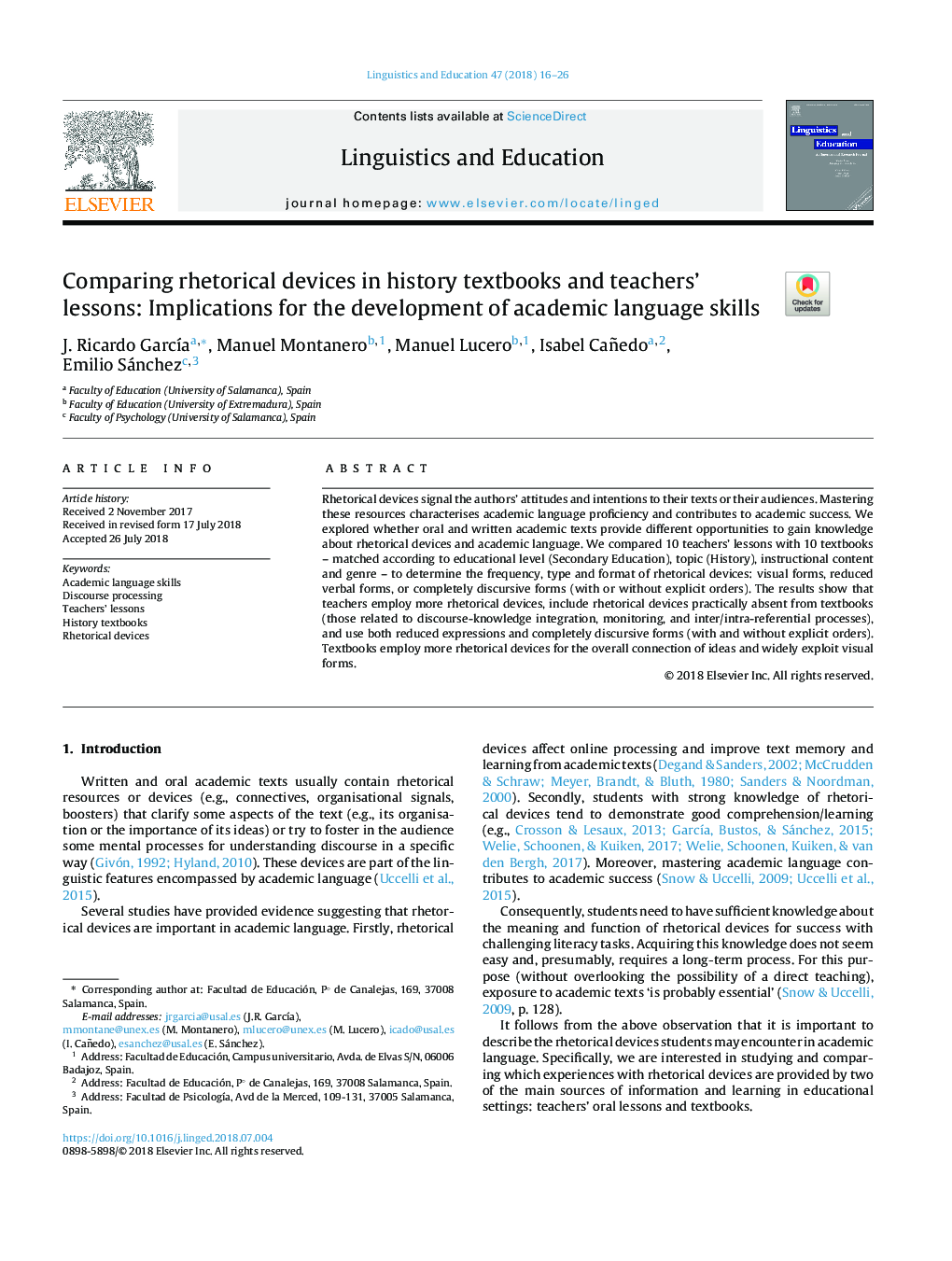| کد مقاله | کد نشریه | سال انتشار | مقاله انگلیسی | نسخه تمام متن |
|---|---|---|---|---|
| 6845880 | 1436470 | 2018 | 11 صفحه PDF | دانلود رایگان |
عنوان انگلیسی مقاله ISI
Comparing rhetorical devices in history textbooks and teachers' lessons: Implications for the development of academic language skills
ترجمه فارسی عنوان
مقایسه دستگاه های لفظی در کتاب های تاریخی و درس آموزگاران: تاثیرات برای توسعه مهارت های زبان علمی
دانلود مقاله + سفارش ترجمه
دانلود مقاله ISI انگلیسی
رایگان برای ایرانیان
کلمات کلیدی
مهارت های علمی آکادمیک، پردازش گفتمان معلم درس ها، کتاب های درسی تاریخ دستگاه های لفظی،
ترجمه چکیده
دستگاه های لفظی نگرش و نیت نویسندگان را به متون و مخاطبانشان سیگنال می دهند. تسلط بر این منابع، مهارت زبان آکادمیک را مشخص می کند و به موفقیت تحصیلی کمک می کند. ما بررسی کردیم که آیا متون رسمی و رسمی ارائه فرصت های مختلف برای به دست آوردن دانش در مورد دستگاه های لفظی و زبان دانشگاهی. ما 10 درس آموزگار را با 10 کتاب درسی مقایسه کردیم که با توجه به سطح تحصیلات (آموزش متوسطه)، موضوع (تاریخچه)، محتوای آموزشی و ژانر، برای تعیین فرکانس، نوع و فرمت دستگاه های گفتاری: اشکال بصری، کاهش شکل کلامی یا اشکال کاملا واضح (با یا بدون سفارش صریح). نتایج نشان می دهد که معلمان، ابزارهای لفظی بیشتری را شامل می شوند، شامل دستگاه های لفظی است که عملا در کتاب های درسی وجود ندارد (آنهایی که مربوط به ادغام دانش گفتمان، نظارت و فرآیندهای بین / درونی)، و از هر دو عبارت کاهش یافته و اشکال کاملا گفتمانی (با و بدون سفارشات صریح) کتاب های درسی، دستگاه های لفظی بیشتری را برای اتصال کلی ایده ها و به طور گسترده ای از اشکال بصری بهره می گیرند.
موضوعات مرتبط
علوم انسانی و اجتماعی
علوم انسانی و هنر
زبان و زبان شناسی
چکیده انگلیسی
Rhetorical devices signal the authors' attitudes and intentions to their texts or their audiences. Mastering these resources characterises academic language proficiency and contributes to academic success. We explored whether oral and written academic texts provide different opportunities to gain knowledge about rhetorical devices and academic language. We compared 10 teachers' lessons with 10 textbooks - matched according to educational level (Secondary Education), topic (History), instructional content and genre - to determine the frequency, type and format of rhetorical devices: visual forms, reduced verbal forms, or completely discursive forms (with or without explicit orders). The results show that teachers employ more rhetorical devices, include rhetorical devices practically absent from textbooks (those related to discourse-knowledge integration, monitoring, and inter/intra-referential processes), and use both reduced expressions and completely discursive forms (with and without explicit orders). Textbooks employ more rhetorical devices for the overall connection of ideas and widely exploit visual forms.
ناشر
Database: Elsevier - ScienceDirect (ساینس دایرکت)
Journal: Linguistics and Education - Volume 47, October 2018, Pages 16-26
Journal: Linguistics and Education - Volume 47, October 2018, Pages 16-26
نویسندگان
J. Ricardo GarcÃa, Manuel Montanero, Manuel Lucero, Isabel Cañedo, Emilio Sánchez,
